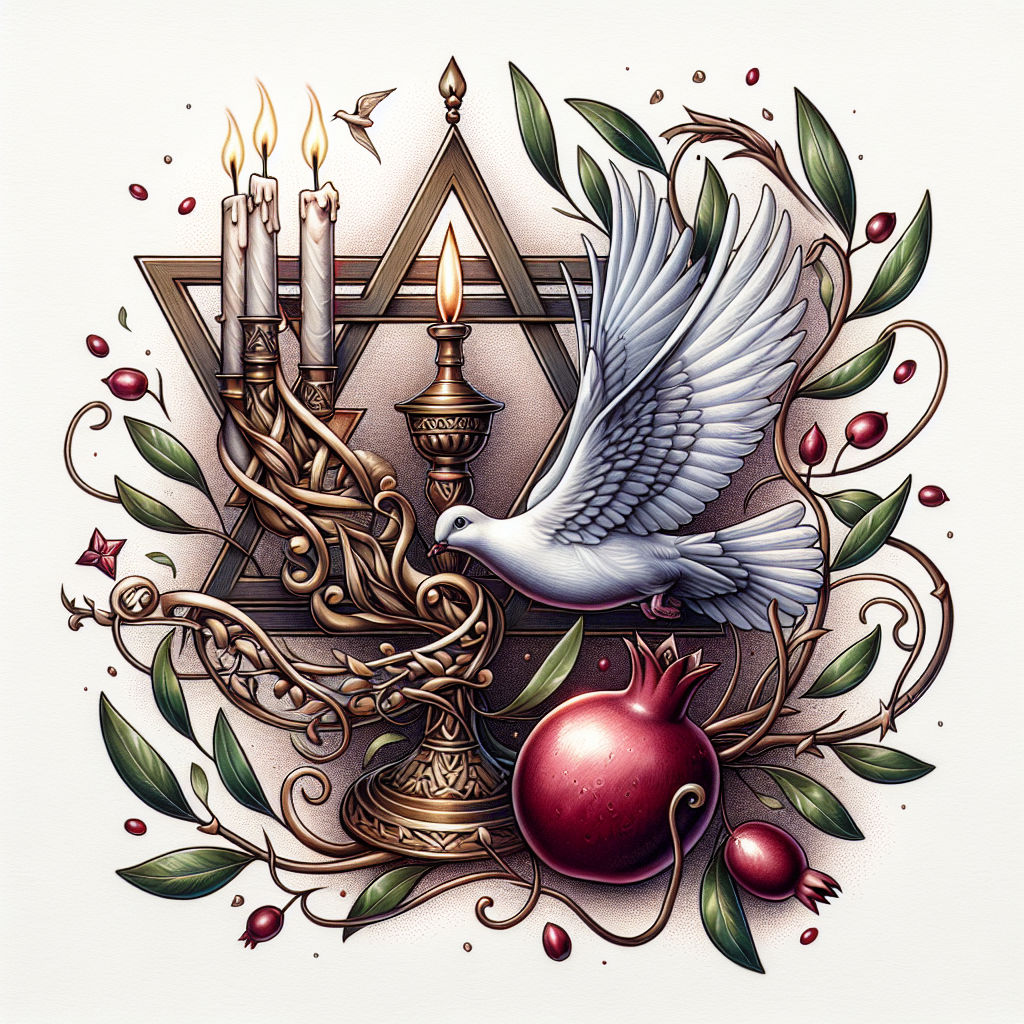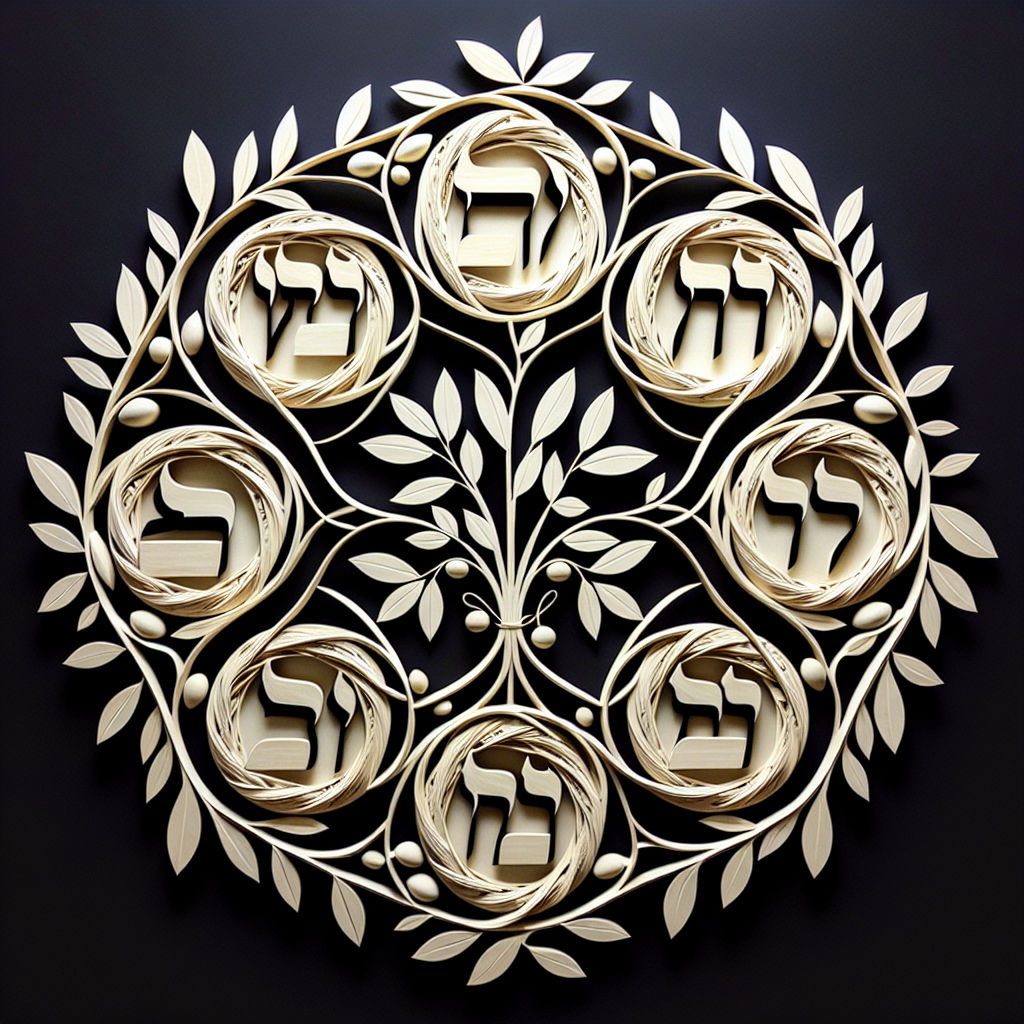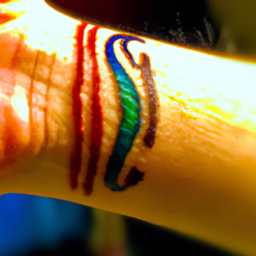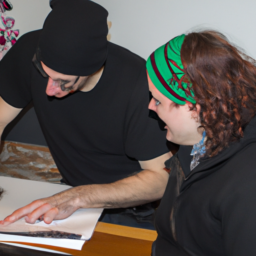“Top 10 Hebrew Tattoo Ideas for Women: Beauty and Meaning”
The Shema Israel: A Tattoo That Speaks to the Soul
In the realm of body art, Hebrew tattoos have emerged as a profound way for individuals, especially women, to connect with their spirituality, heritage, and identity. Among these, the “Shema Israel” holds a place of reverence and deep significance. The “Shema Israel,” which translates to “Hear, O Israel,” is a central declaration of Jewish faith, encapsulating the monotheistic essence of Judaism. It is a testament to the belief in one God and is often recited in prayer and during important religious ceremonies.
For women who choose to inscribe the “Shema Israel” on their bodies, it is not merely a tattoo; it is a profound spiritual connection etched into their very skin. It serves as a constant reminder of their faith, a personal manifesto that they carry with them at all times. The words, taken from the Torah (Deuteronomy 6:4-9), resonate with the core of Jewish belief, making it a powerful statement for anyone who holds these values close to their heart.
When considering the “Shema Israel” as a tattoo, the placement and design variations are as diverse as the individuals who wear them. Some prefer it wrapped around their arm or wrist, symbolizing the strength of their faith encircling them. Others may choose to place it over their heart, signifying the love and devotion they hold for their beliefs. The design can range from simple, elegant script to more elaborate depictions that might include religious symbols such as the Star of David or a menorah, further personalizing the message.
The beauty of the Hebrew script adds an element of mystique and elegance to the tattoo, making it not only a statement of faith but also a work of art. The flowing lines and distinctive characters of the Hebrew language offer a visual appeal that stands out against the more commonly seen Latin script tattoos. For women, the “Shema Israel” tattoo can be designed to complement their femininity while maintaining its spiritual gravitas.
Chai – Life: A Symbol of Vibrant Existence
Another Hebrew tattoo that has found its way onto the skin of many women is the word “Chai,” which means “life.” This simple yet powerful word carries with it a weight of meaning and cultural significance. In Jewish tradition, the number 18 is associated with “Chai,” as the Hebrew letters that make up the word have a numerical value that adds up to 18. This has made “Chai” a symbol of good luck and a representation of the wish for a long and healthy life.
The positive affirmation embodied by “Chai” makes it an uplifting choice for a tattoo. It is a celebration of life itself, an acknowledgment of the preciousness of every moment, and an aspiration for vitality and prosperity. Women who choose this tattoo often do so to express gratitude for life’s blessings and to serve as a personal talisman that promotes positive energy and resilience.
Incorporating the symbol of “Chai” into a feminine tattoo design can take many forms. It can be as straightforward as the two Hebrew letters, חי, etched delicately on an ankle or behind the ear, or it can be part of a larger, more intricate design that includes elements of nature, such as flowers or the Tree of Life, symbolizing growth and continual renewal. The design can be tailored to reflect the individual’s personality and life experiences, making each “Chai” tattoo unique and deeply personal.
Ahava – Love: Embracing the Essence of Connection
Love is a universal language, and in Hebrew, “Ahava” is its beautiful articulation. The word “Ahava” encompasses more than just romantic love; it is about compassion, care, and the deep connections we forge with others. For women, an “Ahava” tattoo can be a declaration of their capacity to love and be loved, a guiding principle that influences every aspect of their lives.
The elegance of the Hebrew script lends itself perfectly to the concept of love. The flowing lines and soft curves of the letters can be designed to mirror the tenderness and warmth that “Ahava” represents. Women may choose to place this tattoo over their heart, on their wrist, or anywhere that holds personal significance, as a reminder to live with love as their compass.
Design suggestions for an “Ahava” tattoo often include elements that complement the theme of love, such as hearts, doves, or even the names of loved ones written in Hebrew alongside the word. The tattoo can be a private expression of affection or a bold statement for the world to see, depending on the wearer’s preference.
In conclusion, Hebrew tattoos offer women a way to adorn their bodies with words of profound meaning, connecting them to their faith, their values, and their personal journeys. Whether it’s the declaration of faith found in the “Shema Israel,” the celebration of life in “Chai,” or the embrace of love with “Ahava,” these tattoos are more than just ink on skin—they are expressions of the soul. It is essential, however, to ensure that the symbolism is understood and the translation is correct, as the power of these words lies in their authenticity. With careful consideration and the help of a skilled tattoo artist familiar with Hebrew script, women can carry these timeless messages with them as beautiful, enduring reminders of what truly matters in life.

Ahava – The Essence of Love Embodied in Ink
In the realm of body art, where every stroke and symbol carries a universe of meaning, Hebrew tattoos have emerged as a profound way for women to express their innermost values and beliefs. Among these, the Hebrew word “Ahava,” which translates to “love,” holds a special place. It’s not just a word; it’s a universal message, a guiding principle that transcends cultural and linguistic barriers.
The allure of “Ahava” lies in its simplicity and the weight it carries. Love is the foundation of human connection, a force that drives us, heals us, and brings us together. When etched onto the skin, it becomes a permanent reminder of the wearer’s commitment to love – be it self-love, romantic love, or the love of humanity.
The elegance of the Hebrew script adds to the appeal of an “Ahava” tattoo. Its flowing lines and ancient heritage offer a visual reminder of love’s timeless nature. Women often choose to place these tattoos on their wrists, over their hearts, or at the nape of the neck – places that are both intimate and can be shared with the world.
Design suggestions for an “Ahava” tattoo often include elements that complement the theme of love. Hearts, intertwined with the Hebrew letters, or a dove, the universal symbol of peace and love, can add layers of meaning to the tattoo. Some may opt for a minimalist approach, letting the word speak for itself in bold, black ink, or choose a more ornate style with delicate shading and flourishes that reflect the complexities of love.
Shalom – A Personal Emblem of Peace
In a world that often feels chaotic and strife-ridden, the quest for peace is more relevant than ever. “Shalom,” the Hebrew word for peace, is not just a greeting or a wish; it’s a deep-seated desire for harmony, completeness, and well-being. A Shalom tattoo is more than just body art; it’s a personal manifesto, a daily reminder of one’s commitment to cultivating peace within and spreading it to the world.
The beauty of a Shalom tattoo lies in its potential to serve as a personal talisman. It’s a visual whisper to pause, breathe, and embrace tranquility amidst life’s storms. Women who choose this word as part of their body art are often making a statement about their values and their hopes for both their personal journey and the larger world.
Design ideas for a Shalom tattoo can be as varied as the individuals who wear them. Some may choose to surround the word with symbols of peace, such as an olive branch or a white feather. Others might incorporate it into a larger scene that represents tranquility, like a serene landscape or a quiet seascape. The font itself can be a work of art, with letters that flow like a gentle stream or stand strong and unyielding like a mountain.
Eshet Chayil – A Tribute to Feminine Strength
“Eshet Chayil,” a phrase from the Jewish Proverbs, translates to “Woman of Valor.” It’s a powerful expression of the strength, dignity, and capability of women. In a society where women’s achievements are often overlooked or undervalued, an Eshet Chayil tattoo is a bold declaration of feminine empowerment. It’s a celebration of the wearer’s accomplishments, resilience, and the inherent value they bring to the world.
The cultural significance of “Eshet Chayil” cannot be overstated. It’s traditionally sung on Friday nights as a hymn of praise for the women of the household, acknowledging their wisdom, kindness, and fearlessness. As a tattoo, it takes on a personal dimension, allowing the wearer to carry this badge of honor with them at all times, a constant source of inspiration and pride.
Design concepts for an Eshet Chayil tattoo often incorporate motifs that symbolize feminine strength and dignity. This could include a lioness, representing courage and authority, or a crown, symbolizing sovereignty and honor. The words themselves can be adorned with floral patterns or woven into a tapestry-like design that reflects the intricate beauty of a woman’s life and contributions.
In crafting a Hebrew tattoo, it’s crucial to ensure the accuracy of the translation and the authenticity of the script. The Hebrew language is rich and complex, and a single misstroke can alter the meaning entirely. It’s equally important to choose a skilled tattoo artist who is familiar with Hebrew calligraphy and can render the script with the precision and respect it deserves.
Hebrew tattoos for women, particularly those that embody concepts like Ahava, Shalom, and Eshet Chayil, are more than mere adornments. They are profound statements of identity, belief, and intention. They serve as a compass, guiding the wearer back to their core values and reminding them of the love, peace, and strength that resides within. As such, these tattoos are not just marks on the skin; they are indelible imprints on the soul, offering beauty and significance that last a lifetime.

The Tree of Life: A Symbol of Eternal Growth and Divine Connection
In the realm of body art, tattoos are more than mere decorations; they are a profound form of self-expression, a canvas for personal storytelling. Among the myriad of symbols that women choose to etch on their skin, the Tree of Life stands out as a timeless emblem, deeply rooted in spiritual and cultural soil. This Kabbalistic and biblical icon is not just a representation of wisdom, growth, and connection to the divine, but also a reflection of the wearer’s innermost beliefs and aspirations.
The Tree of Life is a motif that resonates across various cultures and religions, symbolizing the interconnectedness of all life forms. In the Jewish mystical tradition of Kabbalah, it represents the structure of the soul and the nature of the divine. The tree, with its branches reaching towards the heavens and roots firmly planted in the earth, embodies the quest for higher knowledge while staying grounded in the physical world. It is a symbol of balance, a reminder of our expansive reach and humble beginnings.
Artistic interpretations of the Tree of Life are as diverse as the individuals who wear them. Some may opt for a minimalist design, focusing on the elegant lines of the tree’s silhouette, while others might choose a more elaborate depiction, complete with leaves, fruits, or even birds perched on the branches. The placement of such a tattoo is crucial, as it can enhance the symbol’s significance. The back, representing the backbone of life, or the wrist, a place of pulse and vitality, are popular choices that offer both visibility and a personal connection to the symbol.
When considering a Tree of Life tattoo, it’s essential to collaborate with a skilled artist who can capture the intricacy and depth of this symbol. The design can be tailored to reflect personal growth, with elements that represent significant life events or milestones. It can also serve as a visual prayer, a daily reminder of one’s spiritual journey and the eternal quest for enlightenment.
Hamsa: The Emblem of Protection and Feminine Power
The Hamsa hand, also known as the Hand of Miriam in Jewish tradition, is a potent symbol of protection and the divine feminine. Its depiction of an open hand with an eye in the center has transcended its Middle Eastern origins, captivating the hearts of women worldwide as a tattoo choice. The Hamsa is believed to ward off the evil eye, offering a shield against negative energies and bringing its wearer happiness, luck, and good fortune.
The cross-cultural appeal of the Hamsa hand lies in its universal message of protection and empowerment. For women, this symbol can be particularly resonant, serving as a talisman of strength and independence. The eye at the center of the palm is a watchful guardian, a reminder to be vigilant and wise in the face of adversity. The five fingers of the Hamsa can represent the five senses, urging a harmonious balance between them, or the five books of the Torah, symbolizing knowledge and faith.
Incorporating the Hamsa into a larger, meaningful tattoo piece allows for endless creativity. It can be adorned with intricate patterns, such as those found in traditional henna designs, or combined with other symbols like the Star of David or personal amulets. The Hamsa can be stylized to fit various aesthetic preferences, from the boldly graphic to the softly watercolored.
When choosing a Hamsa tattoo, it’s crucial to consider the orientation of the hand—some believe that a hand facing up repels evil, while a hand facing down invites good fortune and blessings. Placement is also key, with many women opting for locations that they can easily see and draw strength from, such as the forearm, the nape of the neck, or the chest, close to the heart.
Personalized Hebrew Name: The Ultimate Expression of Identity
In the landscape of personalized tattoos, having one’s name inked in Hebrew script is a profound declaration of identity and heritage. The Hebrew language, with its ancient roots and mystical connotations, offers a unique aesthetic that is both visually striking and rich in meaning. A Hebrew name tattoo is not just a mark of individuality; it’s a connection to a lineage, a culture, and a history that is thousands of years old.
The beauty of the Hebrew alphabet lies in its calligraphic potential. Each letter is a work of art, with elegant strokes and curves that lend themselves to various font styles. From the traditional, solemn scripts found in sacred texts to the modern, fluid lines that speak to contemporary design, the Hebrew script can be tailored to match the personality and taste of the wearer.
When personalizing a Hebrew name tattoo, it’s essential to consider the font style and placement carefully. The font should resonate with the individual’s character, whether it’s bold and assertive or delicate and subtle. Placement is equally important, as it can affect the tattoo’s visibility and personal significance. Common choices include the wrist, signifying openness; the shoulder, symbolizing strength; or the ribcage, representing intimacy and vulnerability.
It’s imperative to work with a tattoo artist who is proficient in Hebrew to ensure the accuracy of the translation and the elegance of the script. A misspelled name or an incorrect character can change the meaning entirely, transforming a symbol of pride into a regrettable error. Therefore, verifying the translation and the design with a knowledgeable source is a step that cannot be overlooked.
In conclusion, the Tree of Life, the Hamsa, and personalized Hebrew name tattoos are more than mere adornments; they are powerful symbols that carry deep personal and cultural significance. They offer women a way to celebrate their identity, beliefs, and aspirations in a form that is both beautiful and meaningful. As with any tattoo, the key is to choose a design that resonates on a personal level and to entrust its creation to a skilled artist who understands the symbolism and intricacies of the Hebrew script. These tattoos are not just marks on the skin; they are declarations of the soul, etched in ink for eternity.

The Timeless Wisdom of Hebrew Quotes and Proverbs in Tattoo Art
In the realm of body art, tattoos are more than mere decorations; they are a profound form of self-expression, a canvas for the soul’s narrative. Among the myriad of designs and scripts, Hebrew tattoos stand out for their enigmatic beauty and ancient wisdom. Hebrew quotes and proverbs, in particular, offer a wellspring of inspiration, each character a brushstroke of history and spirituality. For women seeking a tattoo that resonates with depth and meaning, the allure of Hebrew literature and sacred texts is undeniable.
The Hebrew language, with its biblical origins and mystical connotations, carries a timeless appeal. It is a language that has seen civilizations rise and fall, yet its messages remain as relevant today as they were millennia ago. When a woman chooses a Hebrew quote or proverb for her tattoo, she is not simply selecting a phrase; she is embracing a legacy of knowledge and insight that has been passed down through generations.
The wisdom found in Hebrew literature is vast and varied, encompassing themes of love, courage, faith, and the human condition. These texts offer a connection to the divine, to the existential questions that have puzzled humanity since the dawn of time. A Hebrew tattoo can serve as a daily reminder of one’s values and aspirations, a personal mantra that guides and empowers.
Selecting the right quote or proverb is a journey in itself. It requires introspection and a clear understanding of what one wishes to carry forward as a lifelong emblem. The chosen words should resonate on a personal level, reflecting the wearer’s innermost beliefs and experiences. Whether it’s a verse from the Book of Psalms, a line from the wisdom of King Solomon, or a saying from the Talmud, the power of these words is amplified when they hold a special significance to the individual.
Accuracy in translation and calligraphy is paramount. Hebrew is a complex language, and a single misstroke can alter the meaning of a word or phrase. It is crucial to consult with a knowledgeable source, be it a language scholar or a native speaker, to ensure that the tattoo is both linguistically and spiritually correct. The elegance of Hebrew script is undeniable, but its beauty is fully realized only when the words are true to their original intent.
The artistry of the tattooist also plays a vital role. Hebrew calligraphy is an art form in itself, with each letter crafted with precision and grace. A skilled tattoo artist who is familiar with the nuances of the Hebrew script can transform a simple phrase into a masterpiece of design and meaning. The choice of font style, size, and placement on the body can all enhance the personal connection to the tattoo, making it a unique and intimate work of art.
In a world where trends come and go, a tattoo based on Hebrew quotes and proverbs is timeless. It is a choice that transcends the ephemeral, offering a link to the past while speaking to the present and future. For women who wear these tattoos, it is a declaration of identity, a celebration of heritage, and a testament to the enduring wisdom that guides their lives.
In conclusion, Hebrew tattoos, especially those etched with quotes and proverbs, are more than skin deep. They are a testament to the enduring human spirit, a bridge between the ancient and the modern, the sacred and the everyday. As you consider adorning your body with words of wisdom, remember the significance of your choice. It is a privilege to carry such profound messages, a responsibility to honor their origins, and a joy to share their timeless truths.

